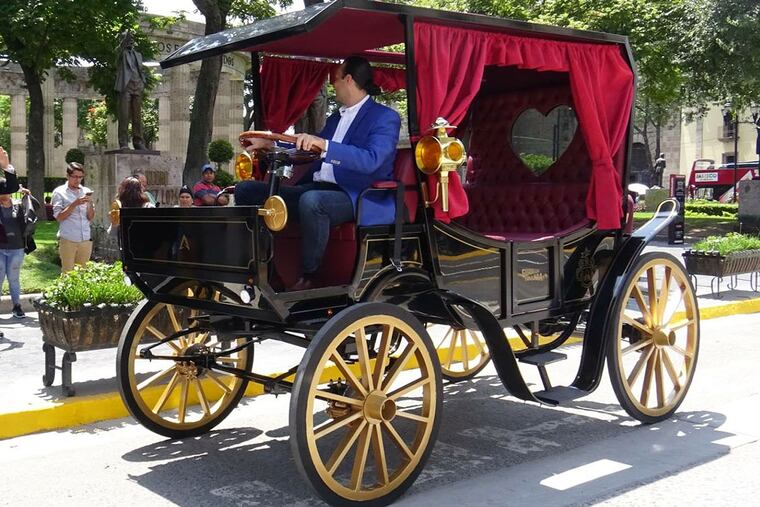N.Y. animal rights group pledges electric carriages for Philly if city bans horse-drawn carriages
The pledge comes with a promise from Councilmember Mark Squilla, who represents Old City, and has promised to introduce legislation for a ban if the the test carriages are street-worthy.

When Philadelphia’s last carriage company pulled its horses from the street and cleared out the stables earlier this year, animal rights advocates rejoiced: For the first time in nearly 50 years, there were no carriage horses on the streets of the city.
But ensuring Philly has indeed seen its last carriage ride will require something more: namely, a permanent ban of horse-drawn carriages from City Council.
That effort took a step forward this week when the Brady Hunter Foundation, a New York nonprofit working to end animal cruelty, committed to purchase electric horseless carriages for Philly, including two to three prototypes that could hit streets this summer.
» READ MORE: Philadelphia’s last carriage company cleared out its stables, but are its tours returning?
Critically, the pledge comes with a promise from Councilmember Mark Squilla, who represents Old City, to introduce legislation for a ban if the electric replacements are deemed street-worthy.
“If these pass inspection and can be manufactured we would introduce it by the end of the year,” Squilla said Friday. “The goal has always been to find an alternative.”
Squilla said he has not yet gauged support from fellow councilmembers for a potential ban.
“I pledged to do it if it works — and I’ll do that,” he said. “I’m not sure who supports it. We haven’t got there yet.”
New York City remains a step ahead in transitioning to electric carriages, with a bill already being debated. Either city would be the first major city in America to use electric carriages.
“The goal here is to get rid of horse carriages in every city in America,” said Josh Fox, executive director of Brady Hunter. “We are committed to getting this done in Philadelphia.”
Advocates are once again celebrating and say they are confident Squilla is serious about a ban.
“Mark Squilla has only had one requirement for a ban – and that was having some type of replacement,” said Tiffany Stair of Revolution Philadelphia, a nonprofit animal rights organization, which has been organizing protests and calling for a ban for two years. Stair participated in the March 24 phone call where Squilla and the Brady Hunter group worked out the prototype plan.
“We are giving you exactly what you want,” Stair said, “and at no cost.”
Alfonso Hernández Olmo, a designer in Guadalajara, Mexico, who is creating the Philly test carriages, said the initial ones will run about $50,000 each, given the short turnaround. Additional carriages would be cheaper, he said. Olmo said he’ll work with PennDot during the design process to make sure the carriages are right for Philly streets.
Besides eliminating what many see as cruel and dangerous work for animals, Olmo said, electric carriages can provide customers with a smoother, quieter ride — and are easier for operators to maintain. The electric carriages would maintain the colonial charm of the old carriages, he said.
“The idea is to bring something that looks like what you have right now and try to make it look better,” he said.
At least one Philadelphia private carriage company has expressed interest in potentially purchasing electric carriages, Fox said.
Either way, Fox and Eric Lerner, chief operating officer of Brady Hunter Foundation, said if the bill passes, their group will ensure support is there to outfit Philly with an electric fleet.
“Our goal here is to show Philadelphia can be a leader in the humane treatment of animals and the protection of an underpaid workforce,” Lerner said. ”We are fully open to working with the owners, operators and workers to ensure a just and equitable transition.”